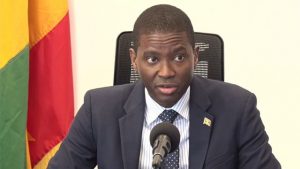 Prime Minister Dickon Mitchell on Sunday called on the United States to remove Cuba from the list of countries labelled as sponsoring terrorism, and to end the economic blockade on the Spanish-speaking nation.
Prime Minister Dickon Mitchell on Sunday called on the United States to remove Cuba from the list of countries labelled as sponsoring terrorism, and to end the economic blockade on the Spanish-speaking nation.
“The people of Cuba have been under an unjust economic blockade for the last six decades and despite that they have not closed themselves off from the world, they have not only looked internally but they have continue to share, continue to help,” he said during a news conference at the Maurice Bishop International Airport to update citizens about the official three-day visit to Cuba.
His return to Grenada coincided with the 45th anniversary of Cuba and Grenada establishing diplomatic ties.
“We owe it to the Cuban people to stand in solidarity with them and to continue to call for removal of the economic blockade against the people of Cuba and the removal of Cuba from the list of countries that sponsor terrorism,” said Mitchell who was surrounded by four government ministers who accompanied him on the trip.
“I want to emphasise this latter point because by continuing to do so, the United States is preventing millions of ordinary men and women from around the world from visiting and experiencing the wonder that is Cuba.
“Cuba certainly has a lot to teach the world, a lot to share with the world and the continued blockade, the continued wrongful listing of Cuba as a state that sponsors terrorism is actually preventing Cuba from giving more of itself to the world. So, we stand in solidarity with you on this issue and we will continue to advocate for its removal,” added Mitchell who received a red-carpet welcome when he arrived in Cuba on April 11.
The UN General Assembly in November 2023 voted by a large margin against the US economic and trade embargo against Cuba, first imposed in 1960. A total of 187 UN member states voted for the resolution put forward each year against the embargo with only the US and Israel voting against and Ukraine abstaining.
The Assembly voiced concern that despite its resolutions dating back to 1992, “the economic, commercial and financial embargo against Cuba is still in place”, and that “the adverse effects of such measures on the Cuban people and on Cuban nationals living in other countries”.
